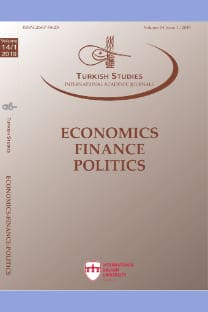An Analysis on the Impacts of the Economic Recommendations of the EU over Turkish Trade and Investments
This study primarily focuses on evaluating the impacts of European Union’s (EU) economic recommendations over Turkish trade and investments during the accession process. The effects were thoroughly examined by analyzing and comparing progress reports published by the EU on Turkey between 2005 and 2019 considering these reports include EU’s advices on the course of economy. Content analysis methodology has been used for the sake of the research. The developments in Turkish economy are investigated by checking the changes in five topics of the EU acquis that fall into the progress reports and related to trade and investment: External openness in trade, market access, financial openness toforeign capital inflows, foreign direct investment (FDI) and current account balance. The findings suggest that, alignment with the EU suggestions are highly advanced in two sections which are openness in trade terms, and financial openness and the foreign capital inflow, particularly before 2010.These areas constitute the external parts of an economy and prove that the interactions with the international markets have been in good shape during the period of investigation. However, it seems that in other areas such as improving current account balance and the environment for the FDIs, Turkey did not perform well enough in line with the advices. EU underlines that there were decreases in the numbers of well-structured actions related to these areas particularly in the last decade. Another interesting finding of the study is that there are some inconsistencies in the recommendations by the EU since the reports sometimes lacked providing a continuous approach and caused some confusions. In conclusion, one can assert that the economic conditionality of the EU has been a stimulus for Turkish economy in some certain areas.
AB ́nin Ekonomiye İlişkin Tavsiye Kararlarının Türk Ticaret ve Yatırımları Üzerindeki Etkisinin Analizi
Bu çalışma, katılım sürecinde Türk ticaret ve yatırımları üzerinde AB'nin ekonomi üzerine önerilerini değerlendirmeye odaklanmaktadır. 2005-2019 yılları arasında AB tarafından Türkiye ́ye ilişkin yayınlanan ilerleme raporları analiz edilerek ve karşılaştırılarak bahse konu önerilerin etkileri ayrıntılı bir şekilde incelenmiştir. Çalışmada, içerik analizi methodolojisi kullanılmıştır. Bu bağlamda, mezkûr ilerleme raporlarında yer alan AB müktesebatınınticaret ve yatırımla ilgili olabilecek 5 başlığındaki değişiklikler minvalinde Türkiye ekonomisindeki gelişmeler araştırılmıştır: Ticarette dışa açıklık; piyasaya erişim, yabancı sermaye girişleri ve finansal açıklık; doğrudan yabancı yatırım (DYY) ve cari işlemler dengesi. Bulgular, AB önerilerine uyumun, özellikle 2010 yılından önce ticarette dışa açıklık ile finansal açıklık ve yabancı sermaye girişi olmak üzere iki bölümde ileri olduğunu göstermektedir. Bu bölümler bir ekonominin dış dünya ile olan ilişkilerine odaklandığından, mezkur bölümlerdeki iyileşmeler inceleme döneminde uluslararası pazarlar ile olan ilişkilerin iyi durumda olduğunu göstermektedir. Ancak, Türkiye’nin cari işlemler dengesi ve DYY ortamının iyileştirilmesi gibi diğer alanlarda öneriler doğrultusunda yeterince iyi bir performans sergileyememiş olduğu görülmektedir. AB, bu konularda iyi planlanmış aksiyonların özellikle son on yılda azaldığını vurgulamaktadır. Çalışmanın bir başka ilginç bulgusu, AB'nin muhtelif önerilerinde bazı tutarsızlıklar olduğudur. Zaman zaman AB raporları süreklilik arz eden bir yaklaşım sunamamakta ve bazı karışıklıklara neden olmaktadırlar. Sonuç olarak, AB’nin ekonomik koşulsallığının Türkiye ekonomisi için bazı alanlarda itici güç oluşturduğu ileri sürülebilir.
___
Afxentiou, P. C. (2000). Convergence, the Maastricht Criteria and their benefits. The Brown Journal of World Affairs, 7(1), 245-254.Alessandri, E. (2010). Turkey's new foreign policy and the future of Turkey-EU relations. Italian Journal of International Affairs, 45(3), 85-100. https://doi.org/10.1080/03932729.2010.504620
Aydın Düzgit, S., & Tocci, N. (2015). Turkey and the European Union. Palgrave.
Baldwin, R., & Wyplosz, C. (2009). Economics of EuropeanIntegration,McGraw-Hill.
Bilgin, N. (2014). Sosyal Bilimlerde Icerik Analizi –Teknikler ve Örnek Çalışmalar.Siyasal Kitabevi.
Davutoğlu, A. (2009). Turkish foreign policy and the EU in 2010. Turkish Policy Quarterly,8(3), 11-17.
Ertuna, O. (2004) Dünden bugüne Türkiye ekonomisi ve 2023’e doğru hedefler. Muhasebe ve Finansman Öğretim Üyeleri Bilim ve Araştırma Derneği Muhasebe ve Finans Dergisi,21, 6-17.
European Commission (2019). Regular reports from the Commission on Turkey’s progress towards accession (1998-2019). https://ec.europa.eu/neighbourhood-enlargement/countries/detailed-country-information/turkey_en
Eder, M. (2003). Implementing the economic criteria of EU membership: How difficult is it for Turkey? Turkish Studies,4(1), 219-244. https://doi.org/10.1080/714005711
Faucompret, E., & Konnings, J. (2010). Turkish Accession to the EU: Satisfying the Copenhagen Criteria. Routledge.
Gökçe, O. (2019). Klasik ve Nitel Icerik Analizi -Felsefe, Yöntem ve Uygulama. Çizgi Kitabevi.
Janse, R. (1994). The evolution of the political criteria for accession to European Community, 1957-1973. European Law Journal,24(1), 57-76. https://doi.org/10.1111/eulj.12253
Kutlu, V., & Kavrukkoca, N. (2007). Evaluating the Maastricht convergence criteria for new prospective European Union member. CentralBank Review,7(1), 13-26.
Lewis, J., & Staerh, K. (2010). The Maastricht inflation criterion: What is the effect of European Union enlargement? Journal of Common Market Studies,48(3), 687-708. https://doi.org/10.1111/j.1468-5965.2010.02069.x
Muftuler, M. (1995). Turkish economic liberalization and European integration. Middle Eastern Studies,31(1), 85-98. https://doi.org/10.1080/00263209508701042
Ministry of European Union of Turkey. (2011). Ankara Agreement.www.ab.gov.tr/_117_en.html.
Ministry of European Union of Turkey (2014). Turkey ́s Progress Report -1998.www.ab.gov.tr/files/AB_Iliskileri/Tur_En_Realitons/Progress/Turkey_Progress_Report_1998.pdf
Ministry of Foreign Affairs of Turkey. (2020). History of Turkey –EU Relations. https://www.ab.gov.tr/brief-history_111_en.html
Oguzlu, T. (2012). Turkey and the European Union: Europeanization without membership. Turkish Studies,13(2), 229-243, https://doi.org/10.1080/14683849.2012.685256
Sezgin, V. (2017). Analysis of the transformation of Turkish exports: From trade liberalization until today. Journal of Aydın Faculty of Economics, 2(2), 1-20.
- ISSN: 2667-5625
- Yayın Aralığı: Yılda 4 Sayı
- Başlangıç: 2006
- Yayıncı: ASOS Eğitim Bilişim Danışmanlık Otomasyon Yayıncılık Reklam Sanayi ve Ticaret LTD ŞTİ
Sayıdaki Diğer Makaleler
Covid-19 Salgınının Küresel Tedarik Zinciri ile Uluslararası Ticarete Etkilerinin Analiz
Traces of Gambling Tendencies in Equity Market Investments
Sıtkı SÖNMEZER, İsmail Erkan ÇELİK
Travmatik Olayların Tüketici DavranışlarınaEtkilerine Yönelik Nitel Bir Araştırma
Ertuğrul KARAKAYA, İbrahim BOZACI, İsmail GÖKDENİZ
Gelişmiş ve Gelişmekte Olan Ülkelerde DemokrasiEndeksiile Borsa Performansı Arasındaki İlişki
Animal Spirits: Belirsizlik Koşullarında Yatırım Kararı
Oktay ÖZKAN, EYYÜP ENSARİ ŞAHİN
